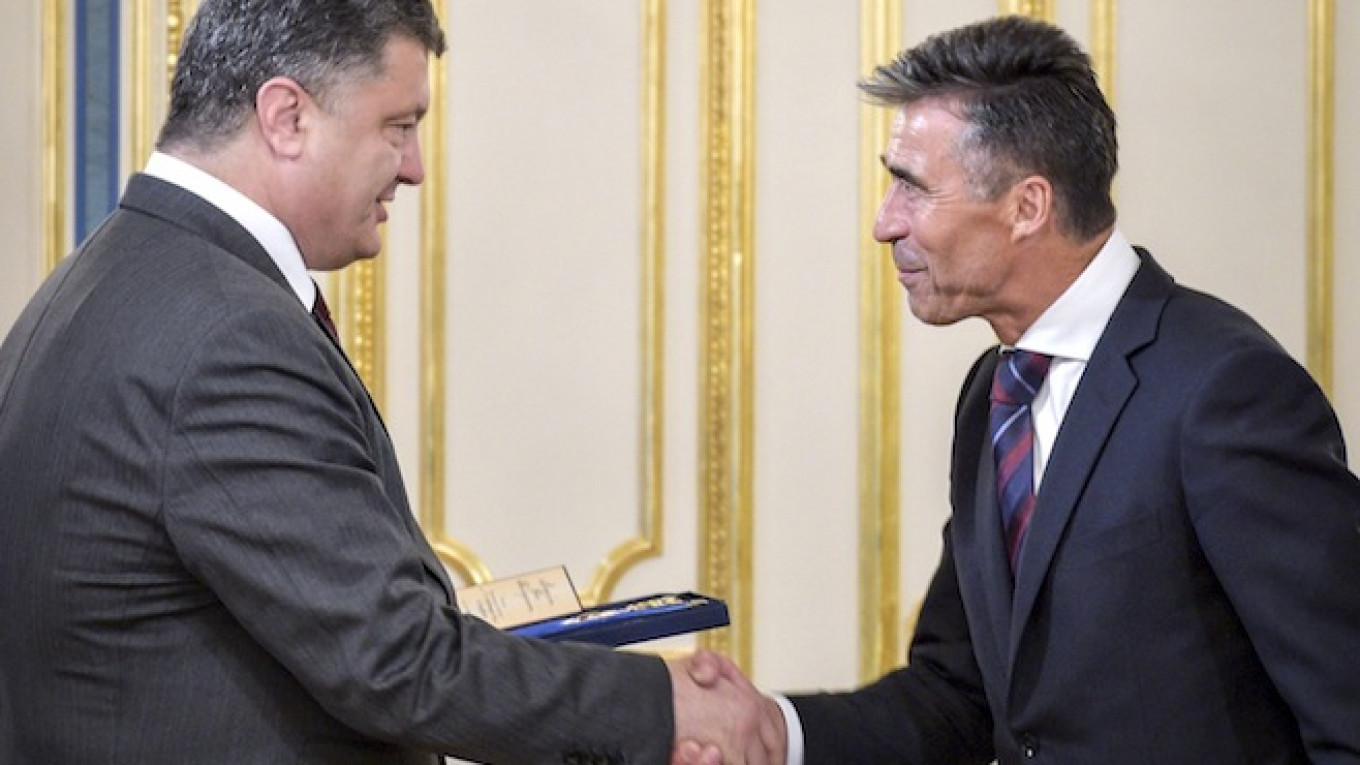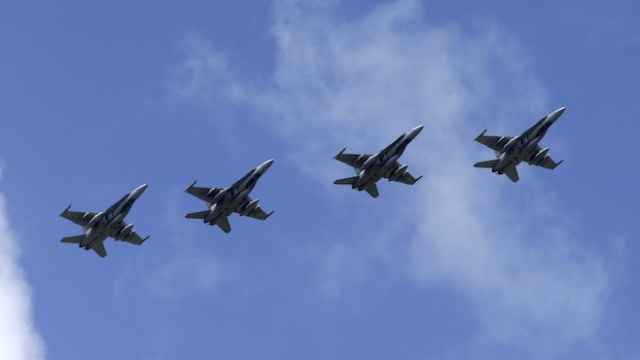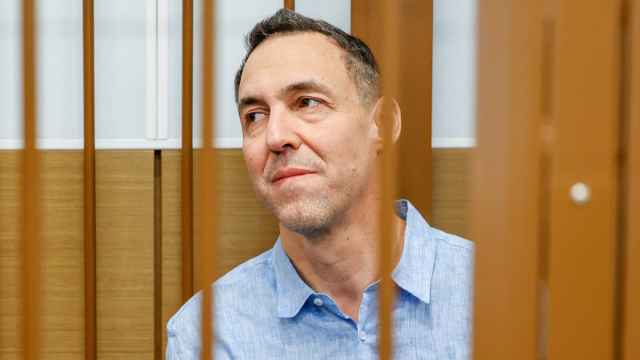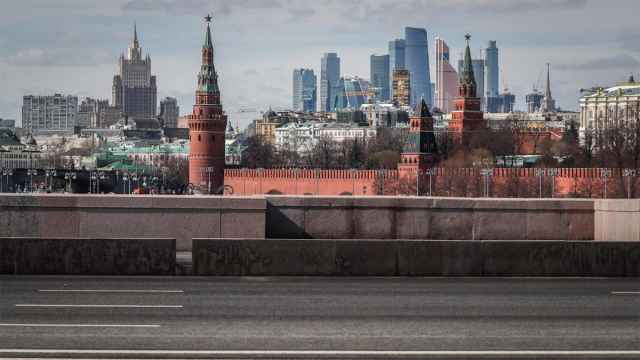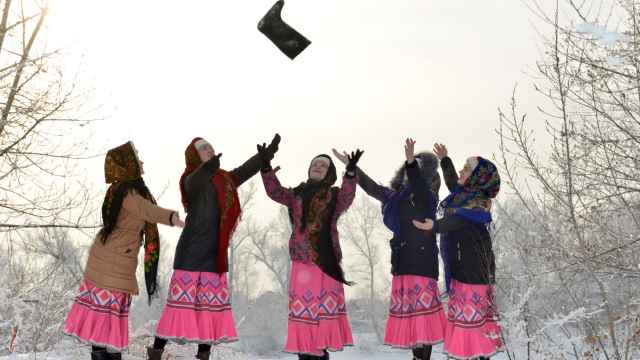LAKE SELIGER, Russia/KIEV — Ukraine called on Friday for full membership in NATO, its strongest plea yet for Western military help after accusing Russia of sending in armored columns that have routed its troops on behalf of pro-Moscow rebels.
Russian President Vladimir Putin, defiant as ever, compared Kiev's drive to regain control of its rebellious eastern cities to the Nazi invasion of the Soviet Union in World War Two. He announced that rebels had succeeded in halting it, and proposed that they now permit surrounded Ukrainian troops to retreat.
Speaking to young people at a summer camp, Putin told his countrymen they must be "ready to repel any aggression toward Russia." He described Ukrainians and Russians as "practically one people," language that Ukrainians say dismisses the very existence of their thousand-year-old nation.
The past 72 hours have seen pro-Russian rebels suddenly open a new front and put Ukrainian troops to flight in strategic coastal territory along the Sea of Azov. Kiev and Western countries say the reversal was the result of the arrival of armored columns of Russian troops, sent by Putin to prop up a rebellion that would otherwise have been on the verge of collapse.
Rebels said they would accept Putin's proposal that they allow newly surrounded government troops to retreat, provided the government forces turn over weapons and armor. Kiev said that only proved that the fighters were doing Moscow's bidding.
Full Ukrainian membership of NATO, complete with the protection of a mutual defense pact with the United States, is still an unlikely prospect. But by announcing it is now seeking to join the alliance, Kiev has put more pressure on the West to find ways to protect it. NATO holds a summit next week in Wales.
NATO's Secretary General Anders Fogh Rasmussen said he respected Ukraine's right to seek alliances.
"Despite Moscow's hollow denials, it is now clear that Russian troops and equipment have illegally crossed the border into eastern and southeastern Ukraine," Rasmussen said. "This is not an isolated action, but part of a dangerous pattern over many months to destabilize Ukraine as a sovereign nation."
So far, the West had made clear it is not prepared to fight to protect Ukraine but is instead relying on economic sanctions, first imposed after Russia annexed Ukraine's Crimea peninsula in March and tightened several times since.
But those sanctions seem to have done little to deter Putin, leaving Western politicians to seek tougher measures without crippling their own economies, particularly in Europe, which relies on Russian energy exports.
European foreign ministers met in Milan on Friday ahead of a weekend EU summit. They made clear the bloc will discuss further economic sanctions against Moscow. Some said that was no longer sufficient, and other measures to help Kiev should be discussed.
Polish Foreign Minister Radoslaw Sikorski said countries that had tried so far to mediate now needed to explain "what their ideas [are] to stop President Putin and save Ukraine as she is." Sweden's Carl Bildt said: "Sanctions alone are not enough: He [Putin] is prepared to sacrifice his own people."
In a symbolic gesture by Poland, one of the most outspoken supporters of Ukraine, Warsaw denied permission for Russia's defense minister to fly over its air space after a trip to Slovakia, forcing him to return to Bratislava.
Moscow still publicly denies its forces are fighting to support pro-Russian rebels who have declared independence in two provinces of eastern Ukraine. But the rebels themselves have all but confirmed it, saying thousands of Russian troops have fought on their behalf while "on leave."
NATO has issued satellite photos of what it says is artillery fielded by more than 1,000 Russian troops fighting in Ukraine. Kiev has released interviews with captured Russian troops. Reuters has seen an armored column of Russian troops on the Russian side of the frontier, showing signs of having recently returned from battle with no insignia on their uniforms. Members of an official Russian human rights body say as many as 100 Russian soldiers died in a single battle in Ukraine in August.
Whipped up by state media, Russians have so far strongly backed Putin's hard line, despite Western sanctions that have hurt the economy, the Kremlin's own ban on imports of most Western food, and now reports of Russian troops dying in battle.
Putin's lengthy public appearance on Friday and his overnight statement on the conflict appear to be an acknowledgment that the war has reached a turning point, potentially requiring greater Russian sacrifice.
Putin answered questions from young supporters, some of whom waved banners bearing his face, at a pro-Kremlin youth camp on the shores of a lake. Wearing a gray sweater and light blue jeans, he looked relaxed, but his tone grew intense while he spoke about Russia's military might, reminding the crowd that Russia was a strong nuclear power.
"Russia's partners ... should understand it's best not to mess with us," Putin said.
Putin compared Kiev's assault on the rebel-held cities of Donetsk and Luhansk to the 900-day Nazi siege of Leningrad in which 1 million civilians died, perhaps the most powerful historical analogy it is possible to invoke in Russia.
"Small villages and large cities surrounded by the Ukrainian army, which is directly hitting residential areas with the aim of destroying the infrastructure … " he said. "It sadly reminds me of the events of the Second World War, when German fascist … occupiers surrounded our cities."
He said the only solution to the conflict was for Kiev to negotiate directly with the rebels. Kiev has long refused to do so, arguing that the rebels are not a legitimate force on their own but proxies for Moscow, which must agree to rein them in.
Earlier, in a statement released by the Kremlin overnight, Putin pointed to the rebels' gains of recent days on the battlefield: "It is clear that the rebellion has achieved some serious successes in stopping the armed operation by Kiev."
"I call on the militia forces to open a humanitarian corridor for encircled Ukraine servicemen in order to avoid pointless victims, to allow them to leave the fighting area without impediment, join their families … " he said.
Alexander Zakharchenko, leader of the main rebel group, told a Russian television station his forces were ready to let the encircled Ukrainian troops pull out, provided they leave behind their heavy armored vehicles and ammunition.
In Kiev, President Petro Poroshenko held an urgent meeting with security advisors overnight, after canceling a trip to Turkey due to the "radically deteriorating situation."
Prime Minister Arseny Yatsenyuk told a government meeting Friday that the Cabinet would "bring before parliament a law to scrap the non-aligned status of the Ukrainian state and establish a course towards membership of NATO."
Were NATO to extend its mutual defense pact to Ukraine, it would be the biggest change in the security architecture of Europe since the 1990s. After the Cold War, NATO defied Russian objections and granted its security guarantee to ex-Communist countries like Poland, Hungary and Romania. But it largely stopped at the border of the former Soviet Union, admitting only the three tiny Baltic states Latvia, Lithuania and Estonia.
In 2008 NATO denied Ukraine and Georgia a fast track toward membership. Russia invaded Georgia a few months later.
This year, after Putin annexed Crimea, NATO countries including the United States have repeatedly said they would be prepared to go to war to protect any member, but not to defend non-member Ukraine.
Kiev hopes to get its message across to Russians that their government is waging war without telling them. Ukrainian Defense Minister Valery Heletey said many Russian soldiers had been captured and killed. "Unfortunately, they have been buried simply under building rubble. We are trying to find their bodies to return them to their mothers for burial."
Russia's defense ministry again denied the presence of its soldiers in Ukraine. "We have noticed the launch of this informational 'canard' and are obliged to disappoint its overseas authors and their few apologists in Russia," a ministry official told Interfax news agency.
A Message from The Moscow Times:
Dear readers,
We are facing unprecedented challenges. Russia's Prosecutor General's Office has designated The Moscow Times as an "undesirable" organization, criminalizing our work and putting our staff at risk of prosecution. This follows our earlier unjust labeling as a "foreign agent."
These actions are direct attempts to silence independent journalism in Russia. The authorities claim our work "discredits the decisions of the Russian leadership." We see things differently: we strive to provide accurate, unbiased reporting on Russia.
We, the journalists of The Moscow Times, refuse to be silenced. But to continue our work, we need your help.
Your support, no matter how small, makes a world of difference. If you can, please support us monthly starting from just $2. It's quick to set up, and every contribution makes a significant impact.
By supporting The Moscow Times, you're defending open, independent journalism in the face of repression. Thank you for standing with us.
Remind me later.


